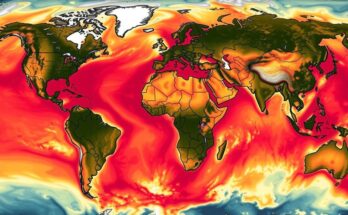Both the WMO and Copernicus report that 2024 is the hottest year recorded, surpassing the 1.5°C threshold. UN Secretary-General Gutérres emphasizes the need for urgent climate action. The findings highlight a consistent trend of global warming linked to greenhouse gas emissions and underscore the significance of immediate measures to address climate change, in light of commitments made under the Paris Agreement.
Recent assessments from the European Union’s Copernicus Earth Observation Program and the World Meteorological Organization (WMO) have confirmed that 2024 has emerged as the hottest year on record, surpassing the critical 1.5 degrees Celsius warming threshold established by international agreements. WMO Secretary-General Antonio Gutérres emphasized the urgent need for transformative climate action, stating that although there may be time to prevent severe climatic consequences, immediate action from global leaders is imperative. This alarming trend is compounded by a decade of unprecedented temperature spikes, extreme weather, and rising sea levels, driven largely by human activities and greenhouse gas emissions. The Copernicus Climate Change Service corroborated these findings, revealing that average global temperatures have risen to 1.6 degrees Celsius above pre-industrial levels, a marginal increase over last year’s record, attributing this to the accumulation of greenhouse gases in the atmosphere.
The alarming data released regarding global temperatures stems from ongoing scientific research into climate change, specifically from organizations dedicated to monitoring the Earth’s climate systems. The WMO and Copernicus play crucial roles in tracking temperature trends, analyzing long-term climatic data, and evaluating the implications of human actions on the environment. The 2015 Paris Agreement set ambitious goals to limit global warming, emphasizing the significance of keeping temperature increases below 1.5°C to mitigate severe climate impacts. Understanding the progression of temperature data is vital for grasping the urgency of the current environmental crisis.
In conclusion, the findings from the WMO and Copernicus indicate an urgent climate emergency, as average global temperatures have risen to unprecedented levels. The implications of this rise include extensive environmental consequences such as extreme weather events and accelerated sea-level rise. With calls for immediate action from UN leadership, it is critical that global policymakers prioritize strategies to curb greenhouse gas emissions and adhere to the goals outlined in the Paris Agreement to avert catastrophic climatic outcomes.
Original Source: en.mercopress.com




